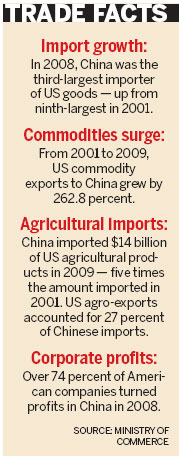US 'Profited' from Chinese Buying
Adjust font size:
The United States has reaped "fat profits" from China's robust purchasing power and its comparatively low labor cost, even amid the financial crisis, the Ministry of Commerce said Friday.

The US has also been taking different approaches to process and evaluate trade figures, leading to its "magnified" trade deficit with China and leaving "great room" for it to improve its exports to the developing country, especially in the high-tech sector, the ministry said.
The remarks came at a time when a number of US senators are demanding for President Barack Obama to label China as a manipulator of its currency and threatening to impose duties on Chinese imports if the country does not appreciate its yuan.
The remarks also came after the US Agriculture Department and US Trade Representative said on Friday that China will again allow imports of US pork, lifting an almost yearlong ban on the meat.
A team led by Vice-Minister of Commerce Zhong Shan will be in the US from March 24 to 26, the ministry said on Friday.
"All trade-related issues will be discussed. The exchange rate is not under the jurisdiction of the ministry, but it is a heated issue and is closely related to trade," Zhong said.
The profit margin for most exporters is less than 2 percent and currency revaluation will threaten the survival of most of them, Zhong said.
"It has been repeatedly said that China has enjoyed much benefit from the US in funding, technology and management, but what cannot be forgotten is also that the US has benefited a lot from China, in many ways," said He Ning, director of the ministry's department of American and Oceanian Affairs.
China became the third-largest importer of the US in 2008, up from being its ninth-largest in 2001.
"China is the single largest overseas importer of US soybean and cotton, and is also an important importer of American automobiles and airplanes," He said. "China's cheap but quality products help US inflation remain fairly low and help US consumers save quite a lot."
As the US economy is still struggling and its unemployment rate remains high, the Obama administration is under growing pressure to improve the situation to win more votes during the US mid-term elections later this year. This is pushing the US to use China as a scapegoat and blame it for undervaluing its yuan, analysts said.
"There are various smooth channels of communication between China and the US, and issues concerning both can be discussed through these channels," He said.
But the discussions "should be made in a scientific way, any move to politicize the issue (of yuan appreciation) will make the situation more complex and create disturbance to communication," he said.
Many Chinese industry leaders also said a stronger yuan could lead to job loss in China.
"Many small and medium-sized companies may go out of business and many people will lose their jobs if the yuan appreciates," said Zhang Yujing, president of the China Chamber of Commerce for Import and Export of Machinery and Electronic Products.
"It's wrong to merely conclude that China-US trade is imbalanced. The US should be responsible," Zhong said.
"The US should be more positive in handling the issue (of trade imbalance) and consider exporting more high-tech products to China," He said.
(China Daily March 20, 2010)